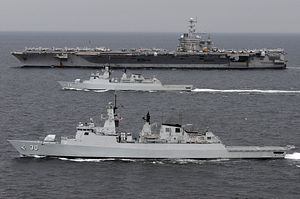On Monday, Malaysia’s defense minister Hishammuddin Hussein suggested if reports that China is placing military assets in the Spratlys are true, it would force the Southeast Asian state into a “pushback” against China.
“If the reports we’ve received from various sources regarding the buildup and placement of military assets in the Spratlys are true – this forces us in a pushback against China,” Hishummuddin told reporters in Kuala Lumpur.
Such headline-grapping quotes by Malaysian officials often raise questions about whether it represents a turning point where Malaysia, one of four Southeast Asian claimants in the South China Sea disputes along with Brunei, the Philippines and Vietnam, is going to take a much tougher stance on the issue.
As I’ve noted before, there are two problems with this sensationalist approach. First, Malaysia has already been gradually hardening its stance on the South China Sea issue over the past few years, so the outlines of its ‘pushback’ are already quite clear and need not be left up to the imagination. Officials publicly speaking out against Chinese incursions (even if China is not referred to by name); defense officials urgently calling for more assets to contend with encroachments into the country’s waters; and Malaysia even entering into negotiations to base U.S. aircraft in the country – some of these moves were inconceivable even a decade ago before China’s recent round of assertiveness in the South China Sea began (See: “How is Malaysia Responding to China’s South China Sea Intrusion?”).
Therefore, the ‘pushback’ Hishammuddin referred to should be viewed as part of this ongoing process of recalibration rather than a dramatic shift of some sort. Indeed, for close observers of Malaysia’s South China Sea policy, some of the specific measures he outlined, including jointly holding China to its word on non-militarization in the Spratlys and closer coordination with fellow ASEAN claimant states Vietnam and the Philippines, represent part of the country’s relatively increased activism on the issue which have been privately in the works for a while and were subsequently disclosed publicly. And we should not be surprised if we see more of such moves in the near future.
Second and equally importantly, that said, a sensationalist approach also does not adequately take into account the complexities inherent in Malaysia’s overall approach. As I’ve mentioned before, Malaysia has traditionally pursued a “playing it safe” approach to the South China Sea, protecting its claims but doing so in a way that does not undermine its important relationship with China – its top trading partner – along with regional stability as well as international law (See: “Malaysia’s South China Sea Policy: Playing it Safe”). Despite the gradual hardening of its stance, as of now the Southeast Asian state has chosen not to abandon this approach entirely. That decision is rooted in several factors including the geographical location of Malaysia’s claims, the history of Malaysia’s relationship with China as well as the limitations of Malaysia’s own military capabilities.
That explains why, even while stating Malaysia’s lingering concerns about Chinese militarization in the Spratlys quite bluntly, Hishammuddin also acknowledged that Malaysia would still emphasize regional collective action and regional stability instead of taking more aggressive moves like deploying its own assets to challenge China. He was also careful to note that Malaysia’s claims would continue to be managed through a “diplomatic channel,” reflecting traditional practice where the Southeast Asian state has sought to bring up concerns directly with China even whilst pursuing other measures.

































